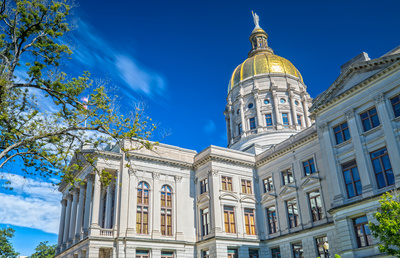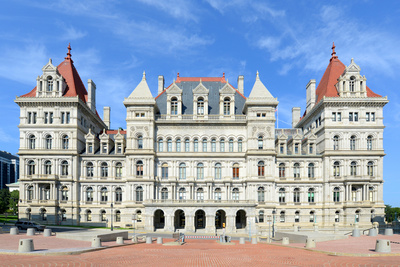In our previous
post, we discussed the state budget difficulties in Illinois, Louisiana, Minnesota, and New Mexico. In part two, we'll examine Kansas, Oklahoma, and West Virginia.
Kansas' fight over tax reform
Kansas Governor Brownback's (R) marquee 2013 tax cuts continued to hang over the legislature's deliberations this year. With the state
repeatedly facing fiscal shortfalls, lawmakers have questioned the wisdom of some of these tax policies, such as exempting pass-through entities from the state's income tax (
lawmakers in other states have even begun using Kansas as an example of how
not to structure tax reform). The chorus grew particularly loud this year as the state faced a two-year revenue deficit of
$900 million and
lawsuit over state education funding that threatened to balloon that figure even further.
Opposing sides of the argument laid out their positions quickly, with Governor Brownback using his
State of the State address to warn against repealing the pass-through income exemption, only to have the legislature pass a repeal bill (
KS HB 2178) before the end of February. This was by far the most support that a repeal effort had received, but it was still not enough to overcome the governor's
inevitable veto. This left lawmakers at an impasse. There was insufficient support for repealing the Brownback tax cuts, but there was
even less support for the governor's recommendation to hike alcohol and tobacco taxes.
This stalemate persisted as legislators failed to come to consensus on state spending. On May 1, the legislature went into overtime, again passing a repeal bill (
KS SB 30) without what appeared to be enough votes to clear a second
guaranteed veto. However, repeal advocates were able to marshal a coalition of moderate Republicans and conservative Democrats to vote
to override the governor. The final vote was 27-13 in the senate and 88-31 in the house.
Lawmakers also considered non-repeal tax reform bills (including measures to
expand the sales tax base and
sunset existing tax expenditures), but these proposals failed to make any significant legislative progress.
The Oklahoma budget deal no one is satisfied with
Coming into the session, Oklahoma faced a
$878 million budget deficit, with elected leaders divided about how to close it. Governor Fallin (R)
announced in February that she would not sign off on a budget that cut deeply into the state's essential services. Instead, her preference was to
expand the sales tax base to include new services, increase the cigarette tax, and eliminate the corporate income tax. The legislature never warmed to her ideas, with Republican lawmakers
particularly criticizing her proposal to tax new services.
In mid-May, with the regular session drawing to a close, and after weeks of closed door negotiations, lawmakers still didn't have a plan to close the fiscal gap, forcing them to move into special session. Finally, after several more days of tense negotiations, lawmakers cobbled together a slate of revenue proposals to balance the state's books. This plan
increases the tax on cigarettes,
partially repeals a sales tax exemption for some car purchases, and
hikes the production taxes on certain oil and gas wells. The final budget had enough votes to become law, but almost everyone agrees that it
is lacking.
But there is a further snag. Under the Oklahoma constitution, revenue bills may not be approved in the final five days of session, and they must receive a three-fourths majority vote (or be subject to a vote of the people), which these bills did not. This leaves the bills open for a relatively straightforward legal challenge, should any taxpayer opt to file suit. Lawmakers have tried to defend their actions by saying that these bills do not qualify because they do not technically raise new revenue but rather eliminate exemptions. It may be up to the courts to decide, in which case the legislature may have to return for further work.
West Virginia's bicameral stalemate
The breadth of tax policy ground that the West Virginia legislature has trod this year is staggering. Faced with a
$500 million budget shortfall, Governor Justice (D)
unveiled a plan to levy a new gross receipts-based tax (fashioned after the
Ohio Commercial Activity Tax), establish a new personal income tax surcharge on high earners, increase the sales tax rate, and expand the sales tax base. Rejecting the governor's approach, the legislature
considered its own set of reforms with proposals including a
fundamental reimagining of the state sales tax,
taxing professional services, and
fully repealing the corporate income tax.
For all their initial boldness, as debate progressed, lawmakers amended most of these proposals' more radical aspects. This reversion toward moderation still wasn't enough for any single revenue proposal to gain majority support. With
only days left in the regular session, legislators were still at an impasse over how to balance the state's books. With no other options, legislators spent their final weekend passing a
clean budget without any significant revenue changes at all, which the governor
colorfully rejected.
Moving into special session, the divisions
came into stark contrast. The senate favored a tax reform agenda that paired a personal income tax cut with an increase in the sales tax rate, while the house advocated for keeping the clean budget and raising some new revenue by expanding the sales tax to include communications services and digital goods. Governor Justice generally seems to have favored the senate approach, but he also wanted to reinvigorate a
scaled-down version of his gross receipts tax proposal to fund state infrastructure projects.
And that's essentially where the parties have been since the special session began, with no end in sight. The governor tried to help foster a deal by
literally walking back and forth between the chamber caucus rooms for days, but that has not yielded concrete results so far. Legislators have also begun their own negotiations in a
conference committee, but this also has yet to lead to any breakthroughs.



